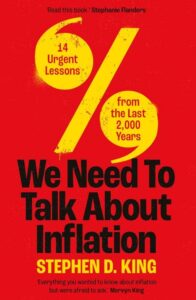We Need to Talk About Inflation
Stephen D King
With the title clearly a take on the Lionel Shriver book, “We must talk about Kevin”, one is immediately warned to approach Stephen King’s book with trepidation. Like Kevin, inflation in this book is bad, particularly if out of control. And like Kevin’s parents, those responsible for keeping inflation in check should be made to read and understand the warning signs early enough and act decisively to tame it.
Otherwise, it all ends in tragedy. Unless of course we learn the lessons – 14 of them according to King, and not just from the recent crises but going back 2,000 years. So we can live happily ever after and in one piece, unlike the characters in Lionel Shriver’s tale.
 Well- that at least is the conclusion one gets to when reading King’s book. There are some lighter moments like the recurring theme of the love/hate relationship between Richard Burton and Elisabeth Taylor to characterise what is going on between monetary authorities and the fiscal side of the equation. Periods of harmony are great. Pulling in opposite directions proves disastrous. And King offers lots of historical examples as to when things went well on the inflation front and when they didn’t.
Well- that at least is the conclusion one gets to when reading King’s book. There are some lighter moments like the recurring theme of the love/hate relationship between Richard Burton and Elisabeth Taylor to characterise what is going on between monetary authorities and the fiscal side of the equation. Periods of harmony are great. Pulling in opposite directions proves disastrous. And King offers lots of historical examples as to when things went well on the inflation front and when they didn’t.
Some interesting conclusions though. In King’s view the argument used by central banks against tightening, that it was all just ‘transitory’, was fuelled by central banks having presided over a low inflation environment for nearly two decades, falling victim of their own anti-inflation propaganda.
As a result, serious mistakes were made when circumstances suddenly changed. We saw the impact of the supply and demand imbalances when Covid restrictions ended and then the extra pressures on energy and food prices with the war in Ukraine. But in King’s view the reappearance of inflation in the last couple of years was not just “a series of unfortunate events” but should have been seen by central banks and acted upon more swiftly.
Central banks must be prepared for the fact that things can change very rapidly. King is not keen on basing rate and other monetary policy decisions just on inflationary expectations as those can change quite quickly, particularly if the public becomes more sceptical or loses trust in the determination or even ability of central banks to control inflation as seems to have happened post-Covid.
Consequently, a transparent monetary policy framework is vital. But it shouldn’t let itself “be hijacked by fiscal excess”, as he puts it. In fact, “monetary policy must dominate fiscal policies”. And he warns against embracing a persistent commitment to quantitative easing (QE) as this creates a permanent moral hazard problem that is then difficult to shift.
Not all would agree. The extra QE since 2020 was for many the only way to ensure that fiscal support to the economy when Covid threatened a new Great Depression could be provided quickly and cheaply. Did it go on for too long? Maybe. We are now seeing inflation drop worldwide though the distributional and cost of living implications of what has taken place so far are clear to see. These developments will leave scars for a while to come. Will the damage be permanent? This remains to be seen.
But this is a fun book to read and with an important underlying message – central banks are under watch everywhere. How they emerge from this inflation crisis will determine both their reputation worldwide and how they evolve from here


